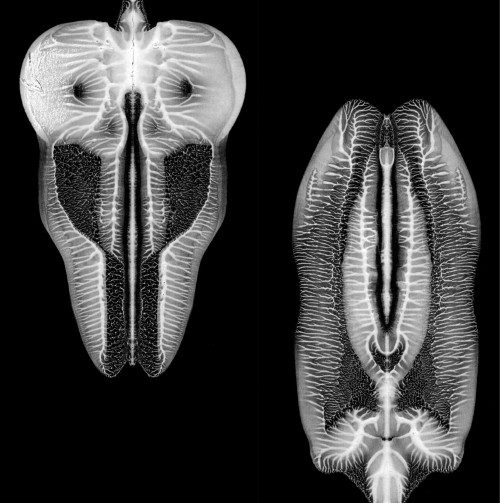Snappy title, eh? Why have the Skull Defekts, Sweden’s premier avant guitar manglers, taken Donald Rumsfeld’s famously cryptic observations on the nature of reality as a starting point for their own plunge into the sonic abyss? Maybe it’s because, just as the gnomic, apparently facile, statements that Rumsfeld made regarding Iraq’s alleged stockpile of WMDs actually did make some kind of twisted sense upon closer inspection, so too does the subterranean, ritualistic noise rock that the Skull Defekts make follow its own compellingly murky logic.
What is rather curious though is why Dances In Dreams Of The Known Unknown sounds like a precursor to the band’s last album, the excellent Peer Amid, rather than its follow-up. Peer Amid certainly shares this album’s Cro-Magnon thump and primitive ardour, but it sounded like it had been made by a tribe that had discovered the secret of fire, skittering flashes of brilliance illuminating the darkness, rather than one still worshipping the moon from the inside of some gloomy cave.
For all that, Dances In Dreams Of The Known Unknown is a brutally effective and strangely hypnotic experience, with many of the songs seeming to be much shorter than they actually are, the listener sucked into some timeless zone where pre-historical gods still roam the earth. Certainly, this seems to be what’s on Joachim Nordwall’s mind as he chants the words "This dance is ancient" through gritted teeth on album opener ‘Pattern Of Thoughts’. This track lays out the Skull Defekts’ modus operandi for much of the rest of the album: a pounding, pitching rhythm backs the sickly detuned snarl of classic period Sonic Youth, while chiming metallic guitars pick out an arcane melody. It’s a great example of the power of repetition over a decent pummelling backbeat, grabbing your attention and keeping it.
‘It Started With The Light’ pretty much repeats this template – despite what the title might suggest, it sounds like the accompaniment to some dank underground ritual, the cellar windows blocked out with animal skins and rags. In fact, there’s an interesting contrast with other Nordic primitivists of recent years such as Dead Skeletons and Goat – whereas these bands make music that aspires to inducing states of ecstasy in the listener, the Skull Defekts instead evoke feelings of abjection, the contemplation of a blank and terrifying void.
‘The Fable’ is perhaps the best track here, its monomanic Sabbath meets The Fall riff relentlessly drives the song forward, while permanent guest vocalist Daniel Higgs sounds like Brian McMahan tripped out on some serious drugs – "Somebody slipped me a substance, I spoke in a tongue unknown to me" – as he recites a gothic, Slint-esque internal monologue over the top. ‘King Of Misinformation’ continues this theme, its ominous pulsating bass and slowly accruing scree of feedback recalling Caspar Brötzmann Massaker, while Nordwall plays a snake-tongued demagogue beckoning the listener through some Scandinavian gateway to Hades.
‘Awaking Dream’ signals a shift in the tonal palette, a glimmer of overcast sky, even as the analogue electronics start to needle like interference in the cerebral cortex. Then we get the two tracks that come closest to actually rocking out on the album, ‘The Known Unknown’ and ‘Venom’, both of which hint at the garage-punk dynamism of Peer Amid’s stand-out song ‘No More Always’ ‘The Known Unknown’ is grounded in a locked groove of fuzz bass and marching drums, as Nordwall relays some Rumsfeld-inspired Freudian fever dream, "It all started with a minor conflict, something about sex and confusion – he went on with armed forces, attacking my brain, it was psychic warfare," sounding not unlike Hawkwind’s Bob Calvert at his most paranoiac. I also seem to have written in my notes at this point "Giant robot elephants!" – make of that what you will. ‘Venom’s propulsive beat and spidery string scraping herald the relative innovation of whacking some reverb on the eastern-tinged guitars, threatening to pull free of the leaden gravity of the Skull Defekts’ crepuscular planet.
But then ‘Little Treasure’ drags us back down into the hammering blackness of Hell’s foundries, with the rasped crooning of the vocals and precision of the riff giving the track a bit of a Loop vibe. Unfortunately, the album doesn’t quite get the pay-off it deserves, with mantric final track ‘Cyborganization’ building, but never really getting anywhere, Higgs awkwardly intoning the title over and over again like a man on the point of some psychotic episode.
If you’re a fan of Peer Amid, this might not quite be the album you were expecting, but on its own terms, they’ll be few better channellings this year of rock as a primordial force, promising liberation through obliteration.


